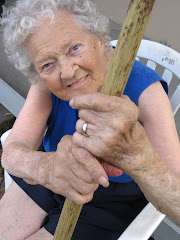Emapathy: the intellectual identification with or vicarious experiencing of the feelings, thoughts, or attitudes of another (Source: dictionary.reference.com)
The key words in the definition above are vicarious experiencing of feelings...of another. If you've not been able to do this before, you'd better learn it while you're helping your parent or other elders. If you don't, I truly believe that you'll get some come-upance when YOU'RE old.
Learning to be empathic is key to remaining patient with Mom and diligent about her care. Mom is sharp of mind but weak in body. Arthritis and osteoporosis has distorted her back, neck and knees. Though she is not in much pain she is weak and her joints just don't work. She can't grasp utensils or glasses very well; door knobs are difficult to turn. She can only walk 10 steps or so then must sit because her knees won't support her 100 pound frame. She can't stand at the bathroom counter to brush her teeth. She can't make a pot of coffee without assistance. All of these limitations mean that she is a like a prisoner in her own body with an active mind and memories of an active life. Like many elders, the thing she fears most is a fall and broken leg, ribs or hip. Often that is the end of our elders; they just don't survive the surgery required to repair the injury and ease their pain.
Remembering this and understanding her frustration, her fear of falling and her isolation makes it much easier to be patient and loving toward her. I might not be patient with others, I may grumble, cuss, chew someone out - but I don't do it to her. I do say things like "this frustrates me too", " I am sorry you can't move around more easily" and "yes, it's a pain in the neck but I'm happy to do it for you" - it seems to make her feel better; to reassure her that I WANT to help her. Often I list those things that she might be feeling - fear, frustration, loneliness, anger - and then I WANT to help her. The old saying "put yourself in someone else's shoes" truly does wonders.
Friday, September 18, 2009
Feel the frustration then let it go
I find myself cussing a lot these days - I cuss silently, I cuss out loud, I send curses to others. "Stupid bastards" has become my favorite thing to say. Mom frustrates me, others frustrate me. Dealing with elderly parents and anyone associated with your parent or their needs IS very frustrating. Mom can't hear me on the phone and I'm tired of yelling into a piece of plastic. Calls don't get returned; people transpose numbers on her insurance claims...etc., etc.... there are thousands of examples but what it boils down to is that others just don't have the same sense of urgency that I feel. They have other customers, patients, kids, jobs and all that to deal with so it means that they get to me - or my Mom - when it's possible and that's not always on my timeline. In my last post, I spoke about control and since this is not something I can control, I've had to learn a new strategy: I feel the frustration. I cuss. I complain out loud ( often only to myself ). I let myself feel the anger, the disappointment and I say "Damn, this is maddening, frustrating - I'm ticked OFF!" Then I'm able to let it go. This was hard at first and it takes practice; after 6 months I'm able to do it.
I can't pretend this stuff doesn't bother me. I can't pretend that everything is A-okay and smile sweetly. It's not okay; often I'm not okay and that's, well - OKAY. It's much easier for me to deal with all of this if I say that I'm frustrated or angry and let it be - let ME be - for a while. It's easier to cool off and then go back at it and do what I need to do.
I can't pretend this stuff doesn't bother me. I can't pretend that everything is A-okay and smile sweetly. It's not okay; often I'm not okay and that's, well - OKAY. It's much easier for me to deal with all of this if I say that I'm frustrated or angry and let it be - let ME be - for a while. It's easier to cool off and then go back at it and do what I need to do.
Subscribe to:
Comments (Atom)



